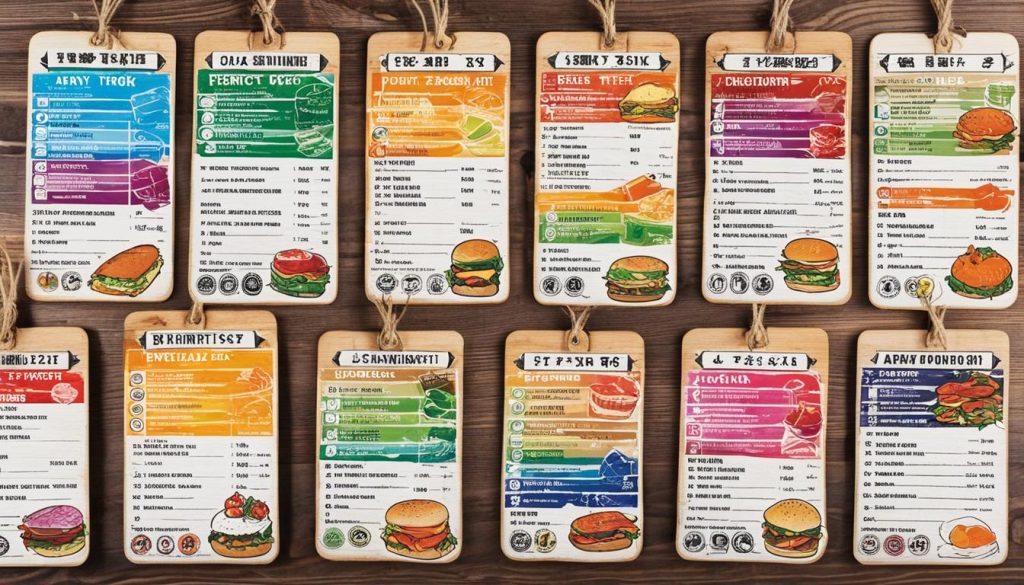If you are considering starting a mobile eatery, launching a food truck business could be an excellent choice. Food trucks have grown in popularity in recent years and are now a prominent feature in the street food landscape. A food truck offers the opportunity to bring your culinary creations to a wider audience, with low overhead costs and the flexibility to move to different locations.
However, starting a food truck business is not a walk in the park. It requires careful planning and consideration of various factors, from obtaining licenses and permits to designing the layout of your mobile kitchen. In this ultimate guide, we will take you through the essential steps for starting a successful food truck business.
Key Takeaways
- Starting a food truck business requires careful planning and research.
- Proper licensing and permits are essential for operating a food truck legally.
- The layout and equipment of your food truck should be optimized for efficiency and branding.
- A compelling menu and effective marketing are key to attracting customers.
- Managing operations and customer service is crucial for maintaining a successful food truck business.
Planning Your Food Truck Business
Proper planning is the cornerstone of any successful food truck business. Conducting market research is the first step in understanding your target audience and identifying gaps in the market. Consider factors such as demographics, consumption patterns, and income levels to determine what kinds of food will appeal to your potential customers. Once you have a solid grasp of the local market, the next step is to develop a comprehensive business plan. This should include details like financial projections, operational costs and marketing strategies.
Defining your target market is also important as it will determine how and where you market your food truck. For example, if your target market is university students, you may choose to park near university campuses during peak hours. On the other hand, if your target market is office workers, you may park near business districts. The location of your food truck is also key. Look for areas with high foot traffic, such as popular tourist attractions, festivals, and markets, to maximize visibility.
Finally, make sure you have a sustainable and profitable pricing strategy in place, as it can make or break your business. Factor in costs like food, fuel, staff, and maintenance expenses when setting prices. Keep in mind that customers are looking for value for their money, so avoid overpricing your menu.
Checklist for Planning Your Food Truck Business
| Steps to Follow | Description |
|---|---|
| Conduct market research | Understand the local market and identify potential gaps. |
| Develop a business plan | Create a detailed plan outlining financial projections, operational costs, and marketing strategies. |
| Define your target market | Determine who your food truck will cater to, such as university students, office workers, or families. |
| Identify suitable locations | Look for areas with high foot traffic, such as tourist attractions, business districts, and markets. |
| Set a pricing strategy | Factor in food, fuel, staff, and maintenance expenses when setting prices. |
“A solid business plan can help you stay focused, monitor your progress, and secure funding.” – John Smith, Founder of Street Eats Food Truck
Obtaining Licenses and Permits
Obtaining proper licenses and permits is crucial for any food truck business to operate legally. Failure to secure the necessary permits can result in hefty fines, legal action or even the closure of your business. This section will provide guidance on the licenses and permits you will need to obtain to run your food truck business effectively.
Health and Safety Regulations
Food trucks must comply with food safety regulations to protect the public from foodborne illnesses. The Food Standards Agency (FSA) and local Environmental Health Departments (EHDs) regulate food businesses and ensure they meet strict hygiene standards.
You will need to register your food truck business with your EHD and complete a food safety course, like a Level 2 Award in Food Safety for Catering, that will teach you how to handle and prepare food safely and avoid contamination.

Food Handling Certifications
Food safety regulations mandate that at least one person on the food truck can prove competency in handling food safely. This person must hold a food handling certificate. It’s a legal requirement.
You can get this certificate by taking a course on food handling that covers topics such as pest control, cross-contamination prevention and food storage. In the UK, the Level 2 Award in Food Safety for Catering is a preferred food handling certification.
Vehicle Permits and Vehicle Certification
Before operating a food truck, you will need to ensure that it passes vehicle certification and is roadworthy. Also, you will need to apply for a Vehicle Excise Duty (VED) tax disc when your business owner has received the vehicle’s Certificate of Conformity or the manufacturer’s statement of compliance from the Driver and Vehicle Standards Agency (DVSA).
Additionally, you will need to acquire a permit from the local organization in charge of transportation in your area. Your EHD may also need to inspect your vehicle and equipment to ensure it meets specific standards.
Specific Requirements Imposed by Local Authorities
Local authorities have the power to enforce additional requirements for food truck businesses in their jurisdiction. These may include operating hours, location restrictions or extra parking permits.
Before launching your food truck, check with your local authority for specific requirements you need to follow. They can provide guidance on how to obtain the right permits and licenses to run your food truck business.
Setting Up and Equipping Your Food Truck
When it comes to setting up a food truck, it’s important to carefully consider the equipment and appliances needed for efficient operation. In addition to essential items such as cooking equipment and refrigeration units, it’s also crucial to think about the layout and design of the interior to maximize space and ensure a comfortable working environment for staff.
Branding and signage are also important considerations for making a food truck stand out and attract customers. Displaying the name and logo prominently, along with an eye-catching design, can help build brand recognition and make the food truck easily identifiable.
Another factor that shouldn’t be overlooked is the power source for the food truck. Many mobile catering businesses opt for a gas-powered generator, but it’s important to choose a model that is both reliable and quiet to avoid disturbing customers and neighbors.
Whether you’re starting from scratch or renovating an existing food truck, careful planning and attention to detail are key to creating a successful mobile eatery.
Menu Development and Food Preparation
For a food truck, a compelling and profitable menu is key to attracting and retaining customers. Here are some tips for developing a menu that stands out:
- Be creative: Offer unique and delicious dishes that are not commonly found in traditional restaurants. This will give you an edge over competitors and attract adventurous and curious customers.
- Keep it simple: A limited menu with a few well-executed dishes is more effective than an overwhelming selection that can slow down service and reduce quality.
- Source quality ingredients: Partner with local suppliers and farmers for fresh, seasonal and sustainable produce. Highlight the origin and quality of your ingredients on your menu, which amplifies the value of your food to customers.
- Consider dietary restrictions and preferences: Offer vegetarian, vegan, and gluten-free options, as well as dishes that cater to different cultures and tastes. This widens your customer base and increases customer loyalty.
- Optimize food preparation processes: Make sure dishes can be prepared quickly and efficiently, allowing for a high volume of orders. Also, consider prepping and cooking some items in advance to ensure faster service time.
- Ensure quality and consistency: Develop standardized recipes and procedures, and train your team thoroughly to ensure that each dish is prepared to a high standard. This guarantees customer satisfaction and consistency that they will yearn for and should promote online for free.
Implementing these tips will ensure your food truck menu is memorable, profitable and keeps customers returning for more.

Marketing and Promoting Your Food Truck
Marketing and promoting a food truck business is crucial for attracting customers and generating revenue. Effective marketing techniques can help increase brand awareness and establish a loyal customer base. Here are some tips for promoting your food truck:
- Create a website or social media page to showcase your menu and location. Use SEO relevant keywords like food truck, mobile catering, street food, food van, mobile kitchen, food stall, food trailer, and mobile eatery in your content to improve your online presence.
- Offer loyalty programs or discounts to repeat customers to encourage them to return and spread the word about your food truck.
- Collaborate with local businesses to host pop-up events or food festivals, and participate in community events to gain exposure.
- Make sure your food truck has eye-catching and clear branding and signage to draw attention.
Emphasize what sets your food truck apart from others. For example, if you source your ingredients locally or use organic produce, highlight these aspects in your marketing materials to appeal to health-conscious customers.
It’s important to have a diverse range of marketing strategies, both online and offline, to reach a broad audience. With the right approach, the marketing and promotion of your food truck can drive success and growth for your mobile eatery.
Managing Operations and Customer Service
Running a food truck is not just about serving delicious food. It also involves efficient management of operations and providing excellent customer service. Here are some essential aspects to consider:
Inventory Management
Effective inventory management is crucial to ensure that you have enough ingredients and supplies to meet demand without the risk of oversupply or waste. Regularly tracking and updating your inventory can help you identify popular dishes and adjust your menu accordingly to optimize profitability.
Staff Hiring and Training
Your staff plays a crucial role in providing quality service and creating a positive impression of your brand. It’s important to hire the right people and provide adequate training to ensure that they are equipped to handle the specific tasks and responsibilities required in the food truck environment. Consider seasonal fluctuations and hire accordingly.
Customer Service Best Practices
Providing exceptional customer service is one of the most effective ways to attract and retain customers. Your customers should feel welcome and valued, and their feedback should be taken into account to improve service and satisfaction. Addressing customer complaints and resolving issues promptly and professionally is key to building a loyal customer base.
Tips for Maintaining High Hygiene Standards
Hygiene is critical in any food-related business, but it’s especially important in a mobile food truck. Proper handwashing, equipment cleaning, and ingredient storage are essential to prevent contamination and ensure food safety. Be sure to follow local health regulations and obtain the necessary certifications to demonstrate your commitment to high hygiene standards.
“Exceptional customer service can differentiate your food truck from competitors and create a lasting impression in customers’ minds.”
Conclusion
In conclusion, starting a food truck business can be a promising venture for entrepreneurs who have a passion for food and a desire to offer unique and delicious cuisine to customers. As outlined in this ultimate guide, careful planning, thorough research, and attention to legal requirements are crucial to success.
It is important to remember that the food truck industry is competitive, and operators must continuously improve their offerings, customer service, and marketing strategies to stand out from the crowd. By creating a strong brand, establishing a loyal customer base, and maintaining high standards of cleanliness and quality, entrepreneurs can build a profitable and sustainable food truck business.
Whether you want to serve up tasty street food, run a mobile catering operation, or offer a unique food van experience, the mobile food industry offers exciting opportunities for aspiring entrepreneurs.
So, start planning your food truck business today, and bring your culinary creations to the streets!
FAQ
What is a food truck?
A food truck is a mobile catering vehicle that sells food and beverages on the street. It is equipped with a kitchen and cooking facilities, allowing it to prepare and serve meals to customers on the go.
How do I start a food truck business?
Starting a food truck business involves several steps. These include conducting market research, developing a business plan, obtaining necessary licenses and permits, procuring a food truck and equipment, developing a menu, marketing and promoting your business, and effectively managing operations and customer service.
What licenses and permits do I need to operate a food truck?
The licenses and permits required to operate a food truck vary depending on your location. However, they typically include health and safety permits, permits for selling food in public spaces, food handling certifications, and vehicle permits. It’s essential to check with your local authorities to ensure compliance with all regulations and requirements.
How can I attract customers to my food truck?
There are several strategies to attract customers to your food truck. These include having a strong online presence through websites and social media platforms, collaborating with local businesses or food festivals, participating in events, offering promotions and discounts, and providing excellent customer service to encourage repeat customers and positive word-of-mouth.
What are the key considerations in setting up a food truck?
When setting up a food truck, it’s important to consider the layout and design of the interior to maximize space efficiency and provide a comfortable working environment. Additionally, equipping the truck with the necessary cooking equipment and appliances is crucial. Branding and signage are also essential to attract customers and create a memorable identity for your business.
How can I develop a profitable menu for my food truck?
To develop a profitable menu, it’s important to consider factors such as customer preferences, food costs, and preparation time. Offer a variety of dishes that appeal to your target market and ensure that the ingredients are fresh and of high quality. Experiment with unique flavors and consider offering seasonal specials to keep customers interested and coming back for more.
How do I manage operations and customer service in a food truck business?
Managing operations in a food truck business involves effective inventory management, staff hiring and training, maintaining cleanliness and food safety standards, and ensuring prompt and friendly customer service. It’s important to develop efficient processes to handle customer orders, payments, and any potential challenges that may arise.




